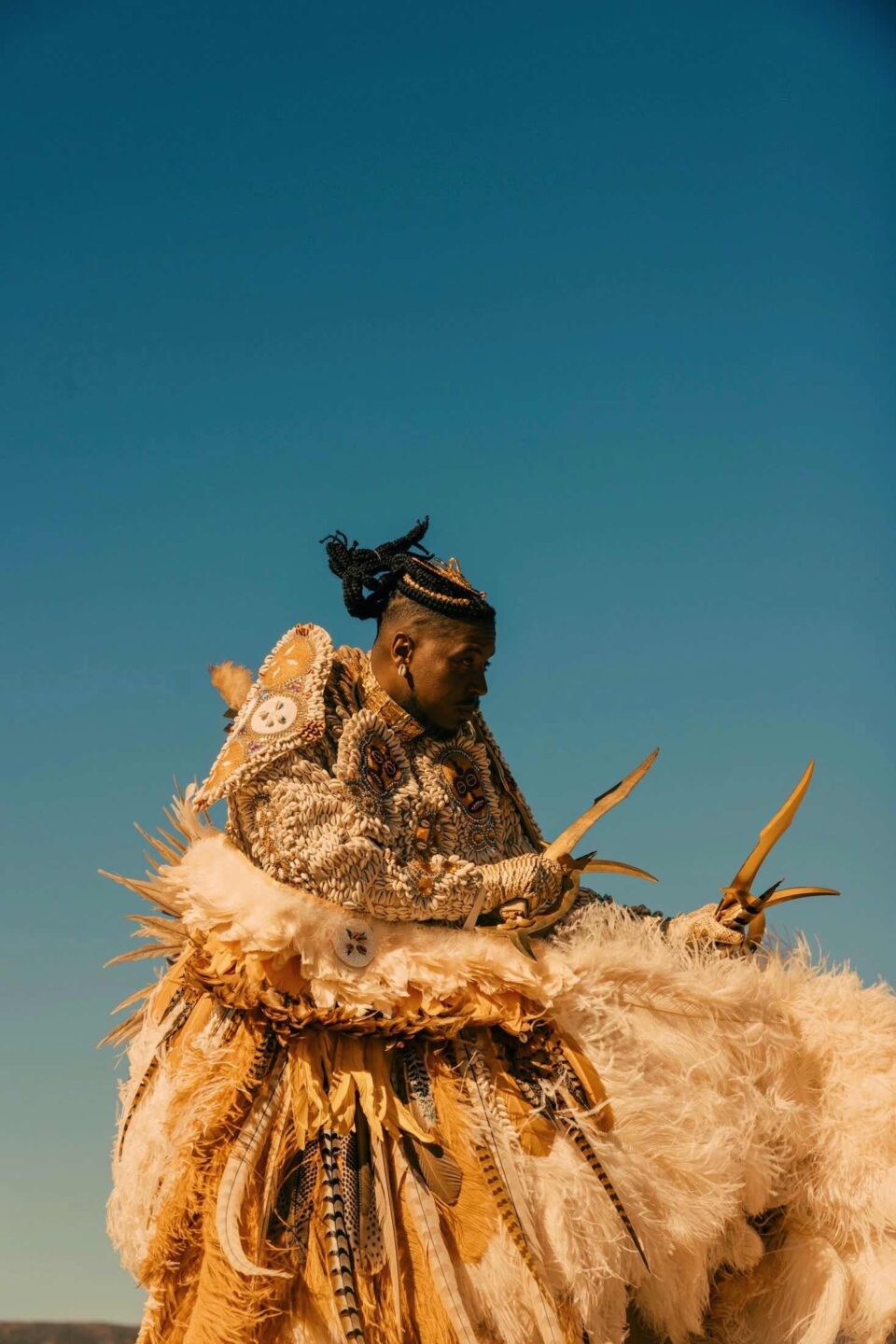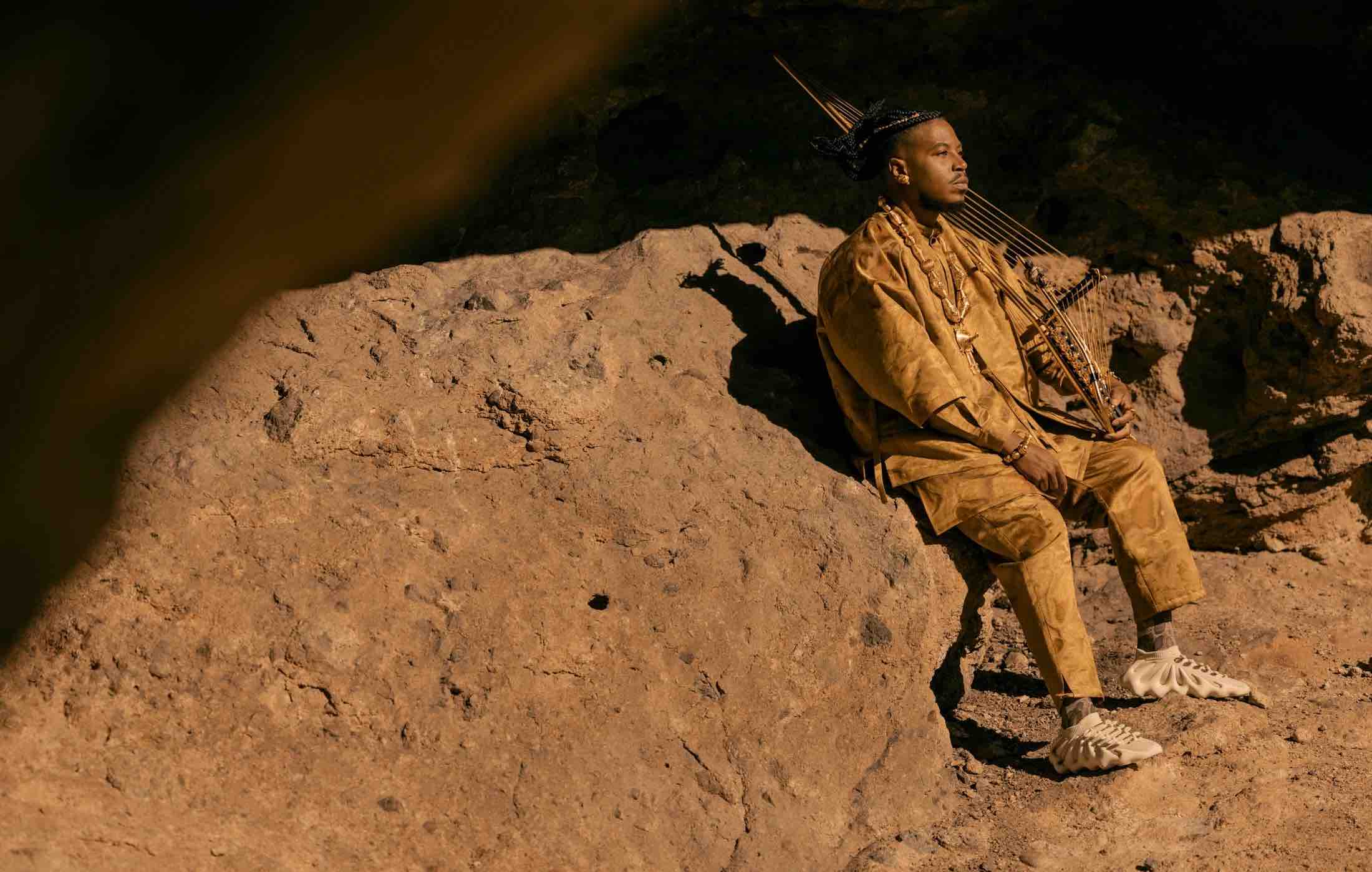Ever since 2002’s (then) eponymously titled debut album Christian Scott, you could hear how the New Orleans–born trumpeter and composer was straining to stretch beyond the confines of jazz, of the limitations of his instrument and the heritage of his name. “I fucking hate the sound of the trumpet. It’s terrible,” he told an interviewer in 2017 upon the creation of literal new modes of communication such as his “Adjuah Trumpet” (an “inverted flugelhorn with shepherd’s crooks” for the ease of higher registers), “The Siren” (a cornet-trumpet hybrid), and his newest creation, the “Adjuah Bow” (a double-sided electric harp with the bonus features of two traditional West African instruments, the ngoni and the kora).
As for who he was and what his music would come to sound like, Scott looked no further than the lineage he held dear: the history of Maroon culture, the Mardi Gras Indian tradition, and the entirety of the African diaspora—but with an eye and ear toward free musicality. Taking his first steps toward emancipation, in 2012, he became Christian aTunde Adjuah for an album of the same name. Earlier this year, he legally changed his name to Chief Xian aTunde Adjuah and created Bark Out Thunder Roar Out Lightning, a new album that has as much to do with jazz as fish do with marbles.
Instead, Bark, with its grandly euphonic vocal chants, vibrant, textural, non-chordal instrumentation, and riveting polyrhythmic display, points to something both worldly and otherworldly—think Miles Davis’ Bitches Brew, Sun Ra’s Space Is the Place, and Fela Kuti’s Why Black Man Dey Suffer rolled into one rocking, undulating, wild groove and stripped of any easy jazz reference. “That fusion 3.0 sonic acumen/architecture meets the 21st century thing that you can’t put into a box,” the Chief tells me with a laugh.
That’s Chief Xian aTunde Adjuah circa Bark Out Thunder Roar Out Lightning. The quarter-century odyssey of becoming “the Chief” is remarkable to him. There’s an awe to “being fortunate” and “being disruptive enough to create new ways of approaching and disseminating music” that entails everything from crafting his own instruments to starting his own Stretch Music label, now in collaboration with Ropeadope Records.
“Embarking on the journey of the Grand Griot and the keeper of the stories for our culture—very dynamic, very old world—is the most valuable part of my life.”
“It’s been, so far, 25 years of really deep levels of beautiful caring, sharing, giving, and community,” says Adjuah in reference to the start of his professional career and its continued journey. Talking about family, the Chief credits his grandmother and his mother’s intentionality toward making him an effective communicator (“Mom and I clapped out rhythms, and [she] taught me the differences between B and B flat—foundational things”), as well as his uncle, jazz saxophonist Donald Harrison Jr., the Big Chief of the Congo Square Nation Afro-New Orleans Cultural Group, for forging his future. “My family were my first collaborators. I know that it’s very important to my grandmother that I hold onto the narrative of us maintaining the skeleton keys, that our expression can stay watered and blossom.”
Thinking back to who he was, and who he is now, what is that Christian Scott to Chief Xian aTunde Adjuah? “All of the things that are and were—what ‘Christan Scott’ was—and grew to be are all parts of Adjuah,” he says carefully. “There’s certainly no separation or distinction between their energies. It’s often an unexplainable thing, a guttural thing. It’s not just what you call something, but also what you answer to.” Thinking back to his childhood in New Orleans, the Chief now believes that when people called him “Christian” they were “up to something” more nefarious than positive. “Named as part of a higher theology, depending on your perspective, people’s relationship to that may not be a positive one.” Foundational moments, though usually beautiful, can also be a bitch.
“All of the things that are and were and grew to be are all parts of Adjuah... It’s not just what you call something, but also what you answer to.”

Freeing himself and coming to the point where he could be, live, and sound off as the Chief, the raucous, complex music of Bark Out Thunder Roar Out Lightning could not have happened if he—the man, the father, the musician-composer—hadn’t fully flowered as Chief Xian aTunde Adjuah first. “The things that I’ve had to go through, in terms of curriculum and the rites of initiation, make Adjuah and Scott different in the short term,” he says. “Embarking on the journey of the Grand Griot and the keeper of the stories for our culture—very dynamic, very old world—is the most valuable part of my life.”
Living free from any genre confines and moving forward with embracing possibility lie at the very root of being the Chief and creating the new album. Recalling the process for Bark’s 17-plus-minute title track as his first expression of tonal and spiritual shift, Adjuah describes it as a rough yet joyous epiphany—for its creator and its audience. “A marriage of everything I am and wanted to be coming together at the same time,” he exclaims in regard to my comment about his new album. “That and the creation of the Bow. All of that was me trying to express so many different layers of who I am now. That couldn’t have been possible for me within my previous framework. I didn’t even hear the trumpet this time. I had to create something much older, ancient, simultaneously forward-thinking and forward-sounding.”
The Bow is truly something: a double-sided harp built to serve as a bridge between the music and craft of African forefather nations of the blues and its descendants—such as Senegal, Nigeria, and Mali—but now in an electric, plugged-in form, all in “a smoking, lightning-bolt, guitar pedal way,” he laughs. “I mean, some of the leaders in Congo Square played a form of double-sided harp. So did 14th century Malian musicians. And the Bow is still a prototype. We’re working with different designers and manufacturers. The new album has many different iterations of what and where the Adjuah Bow was at, at the time, with different numbers of strings…all of it sounding like a 23rd century field recording.”
“I didn’t even hear the trumpet this time. I had to create something much older, ancient, simultaneously forward-thinking and forward-sounding.”
Pulling more, and mightily, from an expression of raw blues and rock and roll (Adjuah performed with Thom Yorke and Flea’s groove-heavy Atoms for Peace outfit and played on Prince’s 2007 funk-punk album Planet Earth) than any jazz we know, Bark is filled with the vision of the Afro-Indigenous Maroon Nations of New Orleans, his ancient African forefathers, and the fresh methodology of the Adjuah Bow. Without his usual trumpet or recognizable chordal instruments (his most recent single, “Trouble That Mornin’,” is a radical percussion and Bow workout), Chief Xian aTunde Adjuah’s new album is out there, all on its own. And proudly.
“My musical expression is always a byproduct of my journey, open and honest, no matter what my journey may be,” says the Chief, thinking out loud in relation to touring and a handful of even newer albums at the ready. “And I can’t wait to see and hear the next step.” FL







